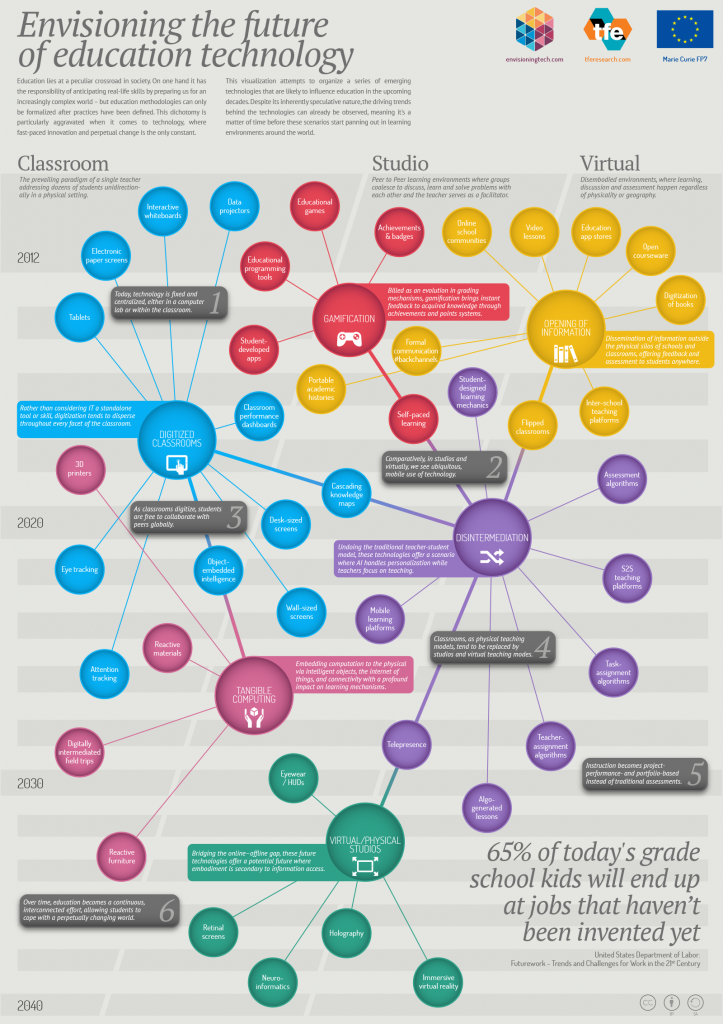One of the main reasons for this massive waste of talent is the very process that is meant to develop it: education.
Articles
Changing Education Paradigms – RSA
Watch this talk by Sir Ken Robinson, world-renowned education and creativity expert and recipient of the RSA’s Benjamin Franklin award, about changing education paradigms. He raises a lot of insightful points regarding the apparent and non-apparent outcomes of the enlightenment educational paradigm that has dominated our learning landscape.
He argues that “great learning happens in groups” and that “collaboration is the stuff of growth.” He also brings forward the argument that the habits of our institutions need to be altered, if significant change in education and, in turn, our society is to happen.
What would it look like if we thought differently about human capacity?
Watch this short film to learn and be amazed.
Book Review: The Mentor’s Guide – Zachary
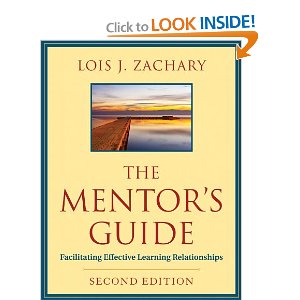 Lois Zachary does not only set out the basic principles and best practices of mentoring in The Mentor’s Guide, she actually goes a step further and helps readers discover their own personal mentoring style and preferences.
Lois Zachary does not only set out the basic principles and best practices of mentoring in The Mentor’s Guide, she actually goes a step further and helps readers discover their own personal mentoring style and preferences.
Through many exercises, she guides the reader through introspection and action. Thus, she not only conceptually ties mentoring to adult education, but she actually writes in a manner according to the principles of adult education.
Consequently, she challenges the prevailing myths of mentoring, and proposes a model of mentoring where both mentor and mentee are fully engaged and learning from one another. Her proposed model is one that is based on critical reflection and application, rather than knowledge transfer and acquisition (Location 300).
[Read more…] about Book Review: The Mentor’s Guide – Zachary
Book Review: On Teaching and Learning – Vella
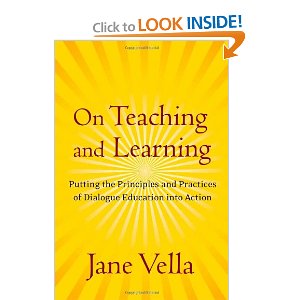 Jane Vella’s On Teaching and Learning is a magnificent follow-up book to the principles of dialogue education she laid out in Learning to Listen, Learning to Teach (2002).
Jane Vella’s On Teaching and Learning is a magnificent follow-up book to the principles of dialogue education she laid out in Learning to Listen, Learning to Teach (2002).
In this book, Vella takes the principles of dialogue education and shows what it looks like to put them into action through both the traditional face-to-face educational setting and also in an online setting.
Dialogue education is not merely a pedagogy; it is more importantly a way to make society a place of peace (xix). Thus, teaching with dialogue education involves listening to learners, empowering them, and respecting them (xix). Consequently, the following statement appropriately sums up the necessary subconscious of dialogue educators – “the dialogue is not a dialogue between teachers and learner, but among learners, of whom the teacher is one” (xxi). [Read more…] about Book Review: On Teaching and Learning – Vella
Book Review: Leadership Can Be Taught – Parks
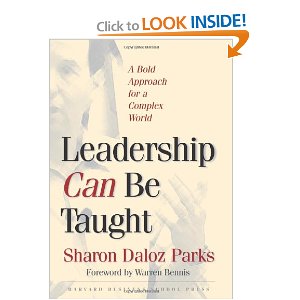 Sharon Daloz Parks’ Leadership Can Be Taught is an examination and illumination of Ronald Heifetz’s teaching method at Harvard’s Kennedy School of Government.
Sharon Daloz Parks’ Leadership Can Be Taught is an examination and illumination of Ronald Heifetz’s teaching method at Harvard’s Kennedy School of Government.
She not only gives the reader an in depth experience of being in Heifetz’s classroom, but she also translates his methodology into transferrable principles for leadership and teaching. She does this by dissecting the case-in-point approach that Heifetz uses. She also dismantles the notion that an individual is born a leader, and plots a way to develop presence – “the ability to intervene, to hold steady, inspire a group, and work in both verbal and nonverbal realms” (13).
In the second half of the book, Parks addresses the transferability of this approach to a variety of different situations, such as the workplace or different classroom settings. She then places herself in the shoes of a teacher, and examines the principles that teachers need to learn in order to teach with this methodology. The book closes with a critique on our culture’s myth of leadership and an evaluation of this method’s strengths and limits.
In a sense, Leadership Can Be Taught is a hybrid-workbook or pathway to help leaders, teachers, and organizations rethink leadership, teaching, and how to learn. [Read more…] about Book Review: Leadership Can Be Taught – Parks
A Look into the Future of Education Technology?
While I don’t fully agree with the long term educational technology trends that TFE Research and Michell Zappa envision here, they did do a fantastic job presenting the landscape of educational technology for now and in the immediate future.
This is a burgeoning field and my hope is to see the church innovate and set the pace for education technology, rather than lag 5-10 years behind. Hopefully, I can be a part of that.
Book Review: The Adult Learner – Knowles
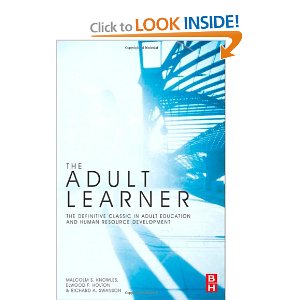 Knowles’, Holton’s, and Swanson’s The Adult Learner serves as a comprehensive overview of the field of adult education.
Knowles’, Holton’s, and Swanson’s The Adult Learner serves as a comprehensive overview of the field of adult education.
Andragogy, in contrast to pedagogy, is a field that focuses on adult learning and everything that ensues. It is “any intentional and professionally guided activity that aims at a change in adult persons” (Location 1174). It does not merely translate pedagogical principles to an adult context, but it is an attempt to focus on the adult learner and “provide an alternative to the methodology-centered instructional design perspective” (Location 124).
This book proposes and argues for six principles of andragogy: the learner’s need to know, the self-concept of the learner, the prior experience of the learner, the readiness to learn, the orientation to learning, and the motivation to learn (Location 155). These core principles are set in the context of individual and situational differences, which are subject matter differences, individual learner differences, and situational differences. This is then set in the context of the broader goals and purposes for learning, which are institutional growth, individual growth, and societal growth (Location 164).
Jesus, Confucius, and Buddha
Here is the difference between Jesus, Confucius, and Buddha according to a Chinese individual that A.B. Simpson knew of (from A.B. Simpson’s The Fourfold Gospel).
“I was down in a deep pit, half sunk in the mire and was crying for some one to help me out. As I looked up I saw a venerable, grey-haired man looking down at me. His countenance bore the marks of his pure and holy spirit. ‘My son,’ he said, ‘this is a dreadful place.’ ‘Yes,’ I said, ‘I fell into it. Can’t you help me out?’ ‘My son,’ he said, ‘I am Confucius. If you had read my books and followed what they taught, you never would have been here.’ ‘Yes, father,’ I said, ‘but can’t you help me out?’ As I looked up he was gone.
Soon I saw another form approaching, and another man bent over me, this time with closed eyes and folded arms. He seemed to be looking into some far-off, distant place. ‘My son,’ he said, ‘just close your eyes and fold your arms and forget all about yourself. Get into a state of perfect rest. Don’t think about anything that could disturb. Get so still that nothing can move you. Then, my child, you will be in such delicious rest as I am. ‘Yes, father,’ I answered, ‘I’ll do that when I am above ground. Can’t you help me out?’ But Buddha, too, was gone.
I was just beginning to sink into despair when I saw another figure above me, different from the others. He was very simple, and looked just like the rest of us, but there were the marks of suffering in His face. I cried out to Him: ‘Oh, Father, can you help me?’ ‘My child,’ He said, ‘what is the matter?’ Before I could answer Him, He was down in the mire by my side; He folded His arms about me and lifted me up, and then He fed and rested me. When I was well, He did not say, ‘Now, don’t do that again,’ but He said, ‘We will walk on together now;’ and we have been walking together until this day.”
The Future of Technology and Education?
Watch this fascinating vision of what the future of our classrooms could look like as technology becomes more accessible and affordable? Imagine if this is how learning took place in our churches?
The sermons would be more interactive and captiviating.
Our discipleship classes would be focused more on holistic and transformative learning, with an emphasis on a variety of learning styles.
A Missional Christian Approach: Perspectives on Death – Part 6/6
 This is my last post of this series and summarizes a missional Christian response to death and tragedy.
This is my last post of this series and summarizes a missional Christian response to death and tragedy.
As I was searching for articles on tragic death, I discovered that there was not a short supply. However, what overwhelmed me was the fact that tragic deaths take place every moment of the day and all over the world, but not every tragic death gets recorded in a news medium. This is a personally painful topic for my family and I, but it is also as painful for millions of others who are dealing through a tragic death.
Christians are notorious for offering “packaged” and over simplistic phrases of comfort to others grieving through a loss – many reflect on the trite phrases that Job’s friends offered to him, in the Book of Job, as he grieved the loss of his family. Since death is something that shakes our entire reality, what ought the Christian response to death be? After all, regardless of one’s faith journey, we are all seeking to find meaning, comfort, and healing in light of these senseless tragic deaths.
So what ought the church’s missional response be to tragic deaths? For it’s congregants and the wider community?
[Read more…] about A Missional Christian Approach: Perspectives on Death – Part 6/6
